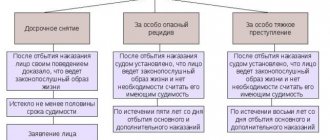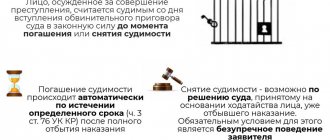Reducing the term of imprisonment or forced labor under certain conditions is called parole (parole). If these conditions are violated, as well as in the presence of serious administrative offenses and crimes, the “udoshnik” may return to the MLS.
Release on parole, as well as its termination with return to MLS, occurs solely by court decision. They don’t just release anyone into freedom and they don’t return them back to the zone under “conditions”! In this article we will look at who is entitled to parole and who is not.
Minimum terms for parole
Article 79 of the Criminal Code of the Russian Federation stipulates the requirements for minimum “sentence” for release on parole. The figure depends on the seriousness of the crime:
- mild and moderate severity – a third of the term;
- serious – half the term;
- especially serious cases, as well as return to prison after a previous parole - two-thirds of the term;
- related to the corruption of minors, drug trafficking, terrorism, organization and participation in criminal communities - three quarters of the term;
- related to sexual abuse of children (under 14 years of age) – 4/5 of the term (a forensic psychiatric examination is required);
- with a life sentence - 25 years;
- committed by pregnant women and women with children under 3 years of age, sentenced for crimes of minor gravity - a quarter of the sentence.
Parole conditions for inmates under the age of 18 (at the time of the crime) are somewhat softer:
- for especially serious cases - from 2/3 of the term;
- for all others - from 1/3.
As confirmation, you can rely on Article 93 of the Criminal Code of the Russian Federation.
Anyone who has served the required part of their sentence can apply for parole, without exception.
However, the minimum period spent in a prison cell (pre-trial detention center + correctional facility) cannot be less than six months. An example of how the parole period is calculated
You need to spend six months in prison
Misconception:
In order to go to court on the issue of parole, you must spend at least six months in a particular colony.
In fact:
According to paragraph 4 of Article 79 of the Criminal Code of the Russian Federation, “the term of imprisonment actually served by the convicted person” cannot be less than six months. Thus, six months must be counted from the date indicated in the sentence as the start date of the term - usually the calculation begins from the moment of detention.
The version that you need to spend six months in a colony is usually spread by the commanders of the detachments. Allegedly, before the expiration of this period, they cannot form an opinion on how effectively the convicted person is being reformed. They may not be able to draw up a character reference, but this does not take away the right to file a petition from the convicted person.
Who can apply for parole
We have dealt with the first point of the parole requirement, but then everything is much more complicated.
The fact is that the Criminal Code states that the court must recognize two things:
- a convicted person does not need to serve his sentence to the end in order to be corrected;
- he somehow compensated for the damage (moral and material) caused by the crime.
The court must take into account the attitude of the applicant for parole to work and study, all penalties or incentives, compensation for harm, and the opinion of correctional institution employees.
There is not a word in the law about repentance, but there is a more vague formulation - “attitude towards the committed act.” That is, if a prisoner wants to be granted parole, it is better for him to abandon his ambitions and thirst for justice, admit his guilt and try to atone for it.
The characteristic from the IU plays a special role. If the colony leadership gives a good reference, the court usually decides the issue positively.
Other circumstances are also taken into account:
- availability of permanent registration;
- Family status;
- characteristics from the place of work;
- sincere repentance;
- any other points that positively characterize the convicted person.
As a rule, not a single prison term is without penalties, even with almost ideal behavior, but you need to try to remove them. Any penalty is lifted automatically after a year, and even earlier if there is an incentive for good behavior and hard work.
In other words, the main thing is to collect the correct package of documents and not enter into confrontation with the PS employees. The ideal option in this regard is to hire a good lawyer who will select the documents and help you draft the petition correctly.






